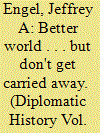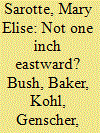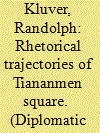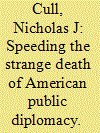|
|
|
Sort Order |
|
|
|
Items / Page
|
|
|
|
|
|
|
| Srl | Item |
| 1 |
ID:
095514


|
|
|
| 2 |
ID:
095515


|
|
|
| 3 |
ID:
095520


|
|
|
|
|
| Publication |
2010.
|
| Summary/Abstract |
One of the biggest sources of tension between the United States and Russia today is the enlargement of the North Atlantic Treaty Organization (NATO), to countries that were either Moscow's allies in the Warsaw Pact or part of the Soviet Union itself. During the Cold War, Leningrad was roughly twelve hundred miles away from the edge of NATO; now (as St. Petersburg) it is less than a hundred, thanks to the membership of Estonia.1 Present-day Russian officials insist that the United States, by enabling and supporting this expansion, has broken promises made during the era of the George H. W. Bush presidency and German unification, when the Soviet Union came to an end.
|
|
|
|
|
|
|
|
|
|
|
|
|
|
|
|
| 4 |
ID:
095518


|
|
|
|
|
| Publication |
2010.
|
| Summary/Abstract |
Having triumphantly forced Iraq from Kuwait only a few months before, President George H. W. Bush turned to address the faithful at the 1991 annual conference of the Southern Baptist Convention, America's largest Protestant denomination and a growing force in Republican politics. Bush's choice of venue revealed much about the power shift in the Republican party's religious and regional identity: here was a straight-laced Episcopalian, born and raised in the Northeast, paying homage to the largely evangelical Southern Baptists. "During the Gulf crisis, Barbara and I, and much of this nation . . . found guidance and comfort in prayer. For me, prayer has always been important but quite personal," he confessed to the increasingly political Southern Baptists. "You know us Episcopalians," he added wryly in a nod to their staid reputation, to the laughter of the Baptist delegates. "And like a lot of people," he continued,
I have worried a little bit about shedding tears in public, or the emotion of it. But as Barbara and I prayed at Camp David before the air war began, we were thinking about those young men and women overseas. And the tears started down my cheeks, and our minister smiled back, and I no longer worried how it looked to others.
|
|
|
|
|
|
|
|
|
|
|
|
|
|
|
|
| 5 |
ID:
095522


|
|
|
|
|
| Publication |
2010.
|
| Summary/Abstract |
The management of U.S. national security (i.e., the coordination of foreign policy, grand strategy, military planning, and force requirements), has become the responsibility of the national security advisor. Curiously, however, the position of national security adviser-arguably the "first among equals" in the determination of diplomatic, economic, and military relations-is not even mentioned in the 1947 National Security Act. The National Security Act, which created the National Security Council (NSC) to replace the State-War-Navy Coordinating Committee (SWNNC), merely refers to "a civilian executive secretary" to be appointed by the U.S. president. In fact, the "assistant to the president for national security affairs," the formal title of the national security adviser, is by statute simply the chairperson of one committee-the Committee on Foreign Intelligence-created within the NSC.
|
|
|
|
|
|
|
|
|
|
|
|
|
|
|
|
| 6 |
ID:
095517


|
|
|
|
|
| Publication |
2010.
|
| Summary/Abstract |
In April and May of 1989, the protest movement that began in Tiananmen Square, in the center of Beijing, became one of the most dramatic and defining episodes in the presidential administration of George H. W. Bush. Global media covered the events daily, feeding images around the globe of students engaged in a standoff with police and military units. While the movement began as mourning for the death of the reformer Hu Yaobang, the drama quickly took on a different character, as students turned their attention from Hu Yaobang and towards perceived failures of the Communist Party of China (CPC) and corruption. The movement ultimately culminated in the bloody military crackdown against the protesters on the night of June 3-4, 1989.
|
|
|
|
|
|
|
|
|
|
|
|
|
|
|
|
| 7 |
ID:
095516


|
|
|
|
|
| Publication |
2010.
|
| Summary/Abstract |
The Reagan administration knew how to throw a great party, and the celebration held on November 17, 1988, in the Organization of American States building in Washington, DC, was no exception. Stretch limos jammed that part of town. Guests included media mogul Rupert Murdoch and the president himself. The gala dinner honored the achievement of Charles Z. Wick, who had served throughout the Reagan years as director of the U.S. Information Agency (USIA).1 Originally established by Eisenhower in 1953, USIA conducted the U.S. government's public diplomacy: advancing foreign policy by engaging foreign publics through radio, press work, exhibitions, publications, cultural exchanges and a host of other channels. Wick's achievement was impressive. USIA had been a key part of the Reagan era's ideological barrage against the Soviet bloc, telling the world about the shooting down of the Korean airliner KAL 007, telling the people of the Soviet Union about the meltdown of Chernobyl, and mobilizing just enough European sympathy to allow the deployment of Pershing missiles. USIA was also part of the emergence of a new political order in Eastern Europe, conducting all manner of exchanges with the Gorbachev regime, and encouraging the voices of reform. The momentous political changes in Eastern Europe during the following year seemed to bear out the message of that November night: that USIA and public diplomacy were now central to American foreign policy. Yet the Reagan/Wick era of public diplomacy did not last. In 1999, USIA was absorbed into the State Department and public diplomacy thereby placed on a back burner.
|
|
|
|
|
|
|
|
|
|
|
|
|
|
|
|
|
|
|
|
|